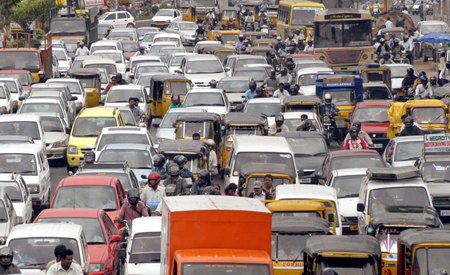Friedman to India: Tax Your Cars to Death
Thomas L. Freidman is at it again. After earning the American auto industry's ire by portraying Detroit automakers as lazy, greedy, foot-dragging Luddites, the New York Times columnist has some advice for aspiring Indian motorists: don't do it. Spooked by the potential environmental impact of a new (if still theoretical) $2500 car, Friedman's urging India to look at wasteful western ways and "leapfrog us, not copy us." Apparently, it's common sense calling. "Just as India went from no phones to 250 million cell phones — skipping costly land lines and ending up with, in many ways, a better and cheaper phone system than we have — it should try the same with mass transit." To that end, Friedman's championing the ideas of Sunita Narain, the "dynamo" who directs New Delhi's Center for Science and Environment: "India can't ban a $2,500 car, but it can tax it like crazy until it has a mass transit system that can give people another cheap mobility option." Friedman tries to recruit our support for his Indian anti-car stance by suggesting that it's one of those win-win deals. "An India that makes itself the leader in both cheap cars and clean mass mobility is an India that will be healthier and wealthier. It will also be an India that gives us cheap answers to big problems." I'm confused. While it's easy (enough) to imagine an Indian mass transit utopia, how exactly would that help us?
More by Robert Farago


































Comments
Join the conversation
Freedom means freedom of mobility. One of the prime reasons I will not give up driving. But if one were commuting to a job with regular hours, then mass transit could work, as say, it does for NYC. Instead of the Indian govt imposing prohibitive taxation on inexpensively priced cars, it might consider introducing (I cannot believe I'm typing this) toll/congestion charges for entry into downtown areas. This charging must be considered only after a capable, dependable alternative (mass) transit system is operational... necessarily privately managed. Privately? One should recall how efficiently the Bombay bus system ran, when operated by the Tatas. Most other metros in India have absysmal government run bus services -- with humans packed like sardines riding within deathtraps. On taxation: the Indian car industry was, for the longest time, encumbered by onerous excise duties on cars; this made almost any car quite the inaccesible luxury for most Indians, well into the '80s. I do not want India to retrogress into that pit of shared human misery that Nehru's socialism rended it into. Let Indians have their efficient, inexpensive cars. Let them have the freedom to travel their vast country on their own schedules; allow them to commute to work on well-managed transit systems... while retaining their freedom to ingress transit-serviced metro areas, on occasions that might demand it, with a moderate congestion charge that discourages frequency to the point of regularity (no hi-fibre jokes, please). Friedman... and you other limousine liberals and the rest of the New Duranty Times luminaries... hands off India, please. Utopia never was and never will be.
"....who used to be an economist once upon a time before he had a stroke and became retarded." A stroke would make a Keynesian Economist smarter.
Ethan has a great point. Friedman is an ass (I know several people that know him. I have seen the signs watching him talk. I have read his stuff. We all agree, he is an ass). How do we solve the problem fairly? He who pays wins. As the price goes up for gas, everyone will use less and pay more. Pretty much to the point that developing countries won't be able to play. It's a shame, but NO OTHER WAY WORKS BETTER. So maybe in addition to being an ass, Friedman has a point. India, and all countries, might want to consider that domestic supplies of energy are the only reliable ones. Burn it if you got it, but realize the price is going up, way up. Is that a big deal. Really, no, but people will make it one. Shall we discuss all the stupid liquids that we have that are much more expensive - bottled water, coke, beer, wine, moisturizer... I will start worrying about gas when it gets more expensive than automobile depreciation. The solution likely won't get here until the problem gets worse. All the schemes to tax gas and spend money on research are just that, schemes. Schemes to get the money from the many and consolidate power in the few.
Indians and Chinese have as much desire and right to live a modern middle class lifestyle as anyone else. Higher gas prices worldwide is the price we all have been and will continue to pay